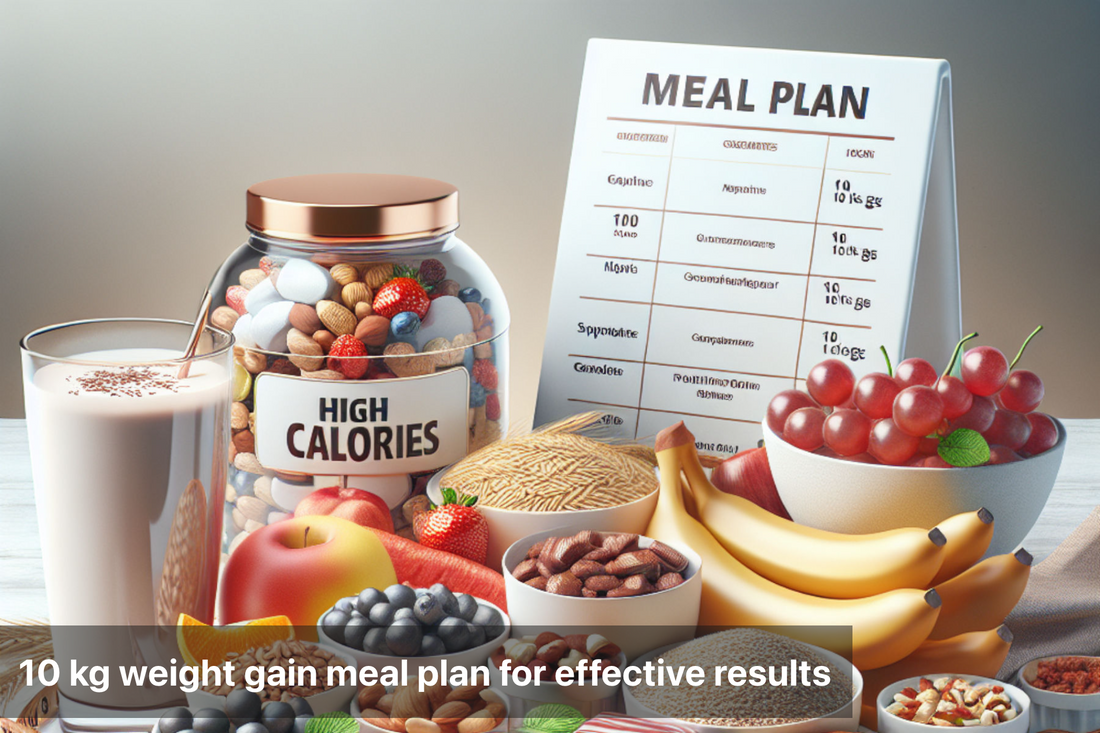
10 kg weight gain meal plan for effective results
Share
While most nutrition talk revolves around weight loss, many people struggle with the opposite challenge—healthy weight gain. Whether you're underweight, recovering from illness, or aiming to build muscle mass, gaining 10 kg requires consistent, strategic eating, not just eating more junk food. The goal is to increase your caloric intake in a nutrient-dense and balanced way so you gain muscle, not just fat.
This guide walks you through a structured meal plan to help you gain 10 kg effectively, along with smart food choices, daily targets, and important dos and don’ts.
How Much Should You Eat to Gain 10 Kg?
To gain 1 kg of weight, you need a surplus of approximately 7700 calories. That means gaining 10 kg requires a net surplus of about 77,000 calories over time. Spread over 3 months (~90 days), that’s a daily surplus of 850–900 extra calories above your maintenance level.
So if your current maintenance is 2000 kcal/day, you’ll need to consume roughly 2800–3000 kcal/day consistently with a focus on protein, healthy fats, and complex carbs.
Key Nutritional Principles for Weight Gain
Protein: Build and repair muscle (1.5–2g per kg of body weight)
Complex Carbohydrates: Provide sustained energy (oats, rice, potatoes, whole wheat)
Healthy Fats: Increase calorie density (nuts, seeds, ghee, avocado)
Frequent Meals: Eat every 3–4 hours, including snacks and pre-bed options
Strength Training: Support lean muscle gain, not just fat storage
Full-Day Meal Plan: 3000+ Calories for Weight Gain
This sample plan is designed for lean mass gain and supports gradual and sustainable 10 kg weight gain over 2–3 months.
Morning (7:30 AM) – Wake-Up Drink
1 glass warm milk with 2 tsp ghee and a pinch of turmeric (180 kcal)
3 soaked almonds + 2 dates (100 kcal)
Breakfast (8:30 AM)
2 boiled eggs + 2 toast with peanut butter (350 kcal)
1 banana + handful of walnuts (200 kcal)
1 glass smoothie (milk + banana + oats + honey) (350 kcal)
Total: ~1000 kcal
Mid-Morning Snack (11:00 AM)
1 boiled sweet potato or 1 bowl poha/upma (250 kcal)
1 glass mango lassi or buttermilk (150 kcal)
Total: ~400 kcal
Lunch (1:30 PM)
1.5 cups cooked rice or 2 rotis with ghee (300 kcal)
1 cup dal or rajma/chole (200 kcal)
1 cup paneer bhurji or chicken curry (250 kcal)
Salad with lemon and olive oil (50 kcal)
Total: ~800 kcal
Evening Snack (5:00 PM)
1 banana shake with almonds and oats (300 kcal)
1 peanut chikki or handful of trail mix (200 kcal)
Total: ~500 kcal
Dinner (8:00 PM)
1.5 cups pulao or 2 chapatis with sabzi (300 kcal)
1 egg curry or tofu dish (200 kcal)
Curd or raita (100 kcal)
Total: ~600 kcal
Post-Dinner (9:30 PM)
1 glass full-fat milk with honey or protein powder (200 kcal)
2 soaked figs or a small banana (100 kcal)
Total: ~300 kcal
Grand Total: ~3600 kcal
You can adjust portion sizes or substitute ingredients as per dietary preferences or caloric needs.
Comparison: Weight Gain vs. Weight Loss Meal Patterns
Component |
Weight Gain Plan |
Weight Loss Plan |
|---|---|---|
Calorie Intake |
2800–3500 kcal/day |
1200–1600 kcal/day |
Meal Frequency |
5–6 times a day |
3–4 smaller meals |
Macronutrients |
High protein + high carb + good fat |
Higher protein + low fat |
Snack Types |
Nuts, shakes, dried fruits |
Fruits, sprouts, herbal tea |
Cooking Medium |
Ghee, butter, oils |
Steamed, baked, low oil |
Key Foods to Include for Weight Gain
Proteins: Eggs, paneer, chicken, tofu, milk, Greek yogurt, protein shakes
Carbohydrates: Rice, whole wheat, oats, potatoes, sweet potatoes, millets
Fats: Ghee, butter, almonds, peanuts, cashews, flax seeds, avocados
High-Calorie Fruits: Bananas, mangoes, dates, figs, grapes
Dairy: Full-fat milk, cheese, curd, smoothies
Supplements That May Help (Optional)
Whey Protein: Helps meet daily protein target
Mass Gainer: For very high calorie needs
Creatine Monohydrate: Supports muscle gain when training
Multivitamin: Covers nutritional gaps in restrictive eaters
Tips for Gaining Weight Effectively
Track calories for the first 1–2 weeks to stay on target
Don’t skip meals or go long hours without eating
Strength train at least 3–4 times a week to support lean gains
Add 2 tbsp peanut butter, banana shakes, or ghee rice for easy calorie boosts
Cook in calorie-dense mediums like ghee or oil, not steam or water
Get 7–8 hours of sleep—muscles recover and grow at rest
Mistakes to Avoid While Trying to Gain Weight
Relying on junk food or sugar—leads to fat gain, not lean mass
Skipping strength workouts—causes bloating and fat accumulation
Not eating enough protein—slows down muscle repair
Not tracking progress—can lead to over/underestimating intake
Summary
Gaining 10 kg might sound like a big goal, but with the right calorie surplus, balanced meals, and strength training, it's fully achievable over a period of 2–3 months. A proper weight gain meal plan should not only increase your calorie intake but also focus on quality nutrition that supports muscle development, digestion, and long-term health.
By eating five to six nourishing meals a day, choosing the right high-calorie foods, and tracking progress consistently, you can reach your target weight safely and sustainably—without turning to empty calories or harmful shortcuts.






